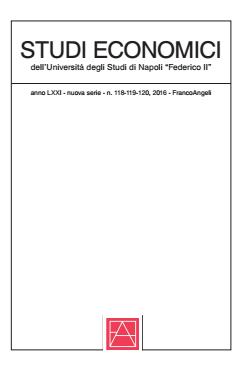
LIBRI DI CARLO PANICO


The paper deals with the role of the expansion of the financial sector in the recent increase in income inequality. It first considers the positions presented by Piketty in his recent book on this theme, criticising his neglect of role of the financial sector and his view that the low growth of the economy is inevitably and is not related to the changes in income distribution. Then it presents some analyses to show that the size of the financial sector affects the distribution of income between social groups. By using these analyses, the paper proposes an interpretation of the role of the financial industry in the recent changes in income inequality and in the burst of the recent financial crisis.

The paper deals with the debt crisis in the euro zone. The literature presents two interpretations of these events. The first attributes the responsibility of the crisis to the political authorities of the countries under attack. They let the citizens live beyond the standard allowed by the economy. This interpretation supports the use of austerity policies to solve the crisis. The second interpretation argues that the political authorities of all the European Union are responsible for the crisis. They kept alive an institutional organization of the coordination process between monetary and fiscal policies, which was known to be faulty. The paper presents theoretical and empirical arguments in favour of the second interpretation. It argues that austerity fails to stabilise the public debt and contends that a coordination process based on effective enforcement and on a European Fiscal Agency can achieve better results by favouring the adoption of coordinated and expansive fiscal policies.

The paper examines how economic policy have been carried out in Europe during the recent financial crisis. It focuses on the changes introduced in the operational procedures of monetary policy in the euro area in 2007 and 2008, pointing out that the objective of the authorities has been to respond to the liquidity needs of the monetary financial institutions, avoiding to loose control over M3. The paper argues that the interventions of the Eurosystem have produced satisfactory results and underlines the problems generated by the fall in productive activity and the need to face them with fiscal policies instruments. The inefficient forms of coordination between monetary and fiscal policies and the management of the government debt in some euro area countries are seen as the main sources of preoccupation for the evolution of the crisis.

The paper deals with the problems of coordination between monetary and fiscal policies in the Euro area. It examines how the existing institutions handle these problems and how the literature evaluates their working, deriving from these evaluations a proposal to reorganise them. The paper points out that there is a need for coordination between monetary and fiscal policies when both cyclical (short-run) and structural (long-run) problems are dealt with. Then it assesses how coordination is carried out under the existing institutional arrangements and identifies which parts of them, according to the existing literature, are in need of modification. Finally, on the basis of the content of this literature, it formulates a proposal to reform the institutional arrangements and the economic content of the Stability and Growth Pact, which aims at making them work effectively.

cod. 363.30
